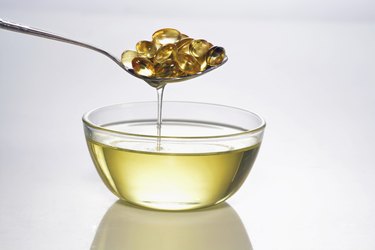
Vitamin B12 and fish oil are obtained by eating certain foods or taking supplements. Vitamin B12 is an essential nutrient important for human metabolism, neurological function and red blood cell formation, and fish oil contains essential omega-3 fatty acids such as DHA and EPA. Vitamin B12 supplements and fish oil supplements are very different; however they may provide some of the same health benefits. Some studies suggest that taking B12 and fish oil supplements together can help enhance positive health outcomes.
Sources
Video of the Day
By eating fish, you can obtain both vitamin B12 and omega-3s DHA and EPA. However, mercury levels are a concern when eating fish, especially for pregnant and nursing women and young children. According to the U.S. Department of Agriculture Dietary Guidelines for Americans 2010, types of fish high in omega-3s and lower in mercury include salmon, anchovies and sardines. In addition to fish, other foods sources for vitamin B12 include beef, chicken, eggs, milk, yogurt and cheese.
Video of the Day
Health Benefits
According to Medline Plus, vitamin B12 is effective for the treatment of pernicious anemia, is likely effective for reducing hyperhomocysteinemia which is a condition related to heart disease, and is possibly effective for the prevention of macular degeneration. Medline Plus also reports that fish oil is effective for lowering triglyceride levels and reducing heart disease risk, and may help reduce high cholesterol levels, high blood pressure and macular degeneration.
Research
In some cases, taking B12 and fish oil supplements together may provide greater health benefits compared with taking each supplement individually. According to Medline Plus, some studies show that using fish oil and B12 supplements together may help enhance their ability to help lower high cholesterol levels.
Dosages
The Institute of Medicine has established a recommended dietary allowance or RDA for vitamin B12 and an adequate intake level or AI for omega-3 fatty acids, abundant in fish oils. The RDA for vitamin B12 is 2.4 mcg per day for adult men and women, 2.6 mcg for pregnant women and 2.8 mcg per day for women who are nursing. The AI for omega-3 fatty acids is 1.6 g per day for adult men, 1.1 g for adult women, 1.4 g for pregnant women and 1.3 g per day for breastfeeding women.
- U.S. Department of Agriculture; Dietary Guidelines for Americans 2010; 2010
- Medline Plus; Vitamin B12; April 2011
- Medline Plus; Fish Oil; February 2011
- Institute of Medicine Food and Nutrition Board: Dietary Reference Intakes (DRIs): Recommended Dietary Allowances and Adequate Intakes for Vitamins and Elements
- Institute of Medicine Food and Nutrition Board; Dietary Reference Intakes: Macronutrients; Jan 2011